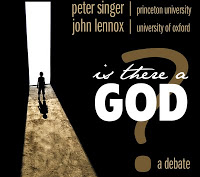Philosophy
 Most public academic debates concerning the existence of God tend to feature religious apologists who propose sophisticated philosophical arguments for the existence of a supernatural or transcendent Being. Here is where we're exposed to things like the ontological argument, the argument from necessity and contingency, the kalam cosmological argument, the moral argument, Pascal's wager, the argument from design or its fine-tuning cousin, etc.
Most public academic debates concerning the existence of God tend to feature religious apologists who propose sophisticated philosophical arguments for the existence of a supernatural or transcendent Being. Here is where we're exposed to things like the ontological argument, the argument from necessity and contingency, the kalam cosmological argument, the moral argument, Pascal's wager, the argument from design or its fine-tuning cousin, etc.
There is something disingenuous about such approaches, however, because the Gods these apologists believe in go way beyond the scope of their own philosophical arguments. Finding a necessary being (or a first uncaused cause or a fine-tuner or a transcendent, immaterial mind or whatever they want to claim) in no way tells us that therefore Mary got knocked up immaculately, that Joseph Smith wasn't just a charlatan and a fraud, that Mohammed wasn't really a pedophile, that Jesus resurrected and ascended to heaven, or that evolution is just an illusion perpetrated by the Flying Spaghetti Monster.
 Even if these arguments could establish the existence of some sort of supernatural transcendence (and you can be the judge of that yourself), these arguments utterly fail to tell us anything substantial about the nature of said transcendence: whether it's one being or many, whether it's personal or merely abstract, whether it's concerned with human affairs, whether it interacts with the physical universe, or whether it's interested in having a personal relationship with you.
Even if these arguments could establish the existence of some sort of supernatural transcendence (and you can be the judge of that yourself), these arguments utterly fail to tell us anything substantial about the nature of said transcendence: whether it's one being or many, whether it's personal or merely abstract, whether it's concerned with human affairs, whether it interacts with the physical universe, or whether it's interested in having a personal relationship with you.
So, it is kind of ironically refreshing in a way to see in the following debate with philosopher Peter Singer, that Oxford mathematician John Lennox tries to argue quite explicitly (and without much mental prestidigitation) for the existence of the Christian God specifically and not just the so-called philosopher's God (a perfect, omnipotent, omniscient, omnipresent and omnibenevolent being), as other apologists tend to do in their dishonest attempt to seem intellectually sophisticated while defending utterly primitive and irrational beliefs inherited from illiterate goat herders. Whether he succeeds, of course, is another story, but the exchange between the two thinkers is cordial and amiable, and quite interesting as well.
I'll post the debate between Lennox and Richard Dawkins in a few weeks, so stay tuned.
- Types Of Atheism, Religion In History, And Philosophy Today
J.T. asks, "Should atheism be defined as an absence of belief in God (or gods)? Or should it be defined as as an explicit affirmation that gods do no exist? Is there a true distinction between these two definitions? And finally, should agnosticism be...
- Valid Arguments Vs. Sound Arguments
Validity and soundness are one of the most important terms in logic. How to distinguish between deductively valid and invalid arguments as well as between sound and unsound arguments? The definition is very much straightforward and it is all that is needed...
- God And Philosophy: Does God Exist?
Saint Anselm of Canterbury (c. 1033-1109) Theists seek the proofthat God exists while atheists seek the proof that God doesn?t exist. You?re probably wondering if there is any evidence that God exists (or that he does not)? Philosophy of religion is perhaps...
- Tribute To Christopher Hitchens
Widely considered to be one of the Four Horsemen of Atheism, Christopher Hitchens is an intellectual hero to many agnostics, skeptics and nonbelievers. I greatly admire the man's intelligence, erudition, candor, humor and eloquence, but I have to...
- William Lane Craig Vs Peter Millican - Does God Exist?
While there is a venerable history of philosophical inquiry into the question of God's existence, debates geared for lay audiences out there tend to display a painful and embarrassing lack of philosophical sophistication. To begin with, the distinction...
Philosophy
Peter Singer vs John Lennox - Is There a God?

There is something disingenuous about such approaches, however, because the Gods these apologists believe in go way beyond the scope of their own philosophical arguments. Finding a necessary being (or a first uncaused cause or a fine-tuner or a transcendent, immaterial mind or whatever they want to claim) in no way tells us that therefore Mary got knocked up immaculately, that Joseph Smith wasn't just a charlatan and a fraud, that Mohammed wasn't really a pedophile, that Jesus resurrected and ascended to heaven, or that evolution is just an illusion perpetrated by the Flying Spaghetti Monster.
 Even if these arguments could establish the existence of some sort of supernatural transcendence (and you can be the judge of that yourself), these arguments utterly fail to tell us anything substantial about the nature of said transcendence: whether it's one being or many, whether it's personal or merely abstract, whether it's concerned with human affairs, whether it interacts with the physical universe, or whether it's interested in having a personal relationship with you.
Even if these arguments could establish the existence of some sort of supernatural transcendence (and you can be the judge of that yourself), these arguments utterly fail to tell us anything substantial about the nature of said transcendence: whether it's one being or many, whether it's personal or merely abstract, whether it's concerned with human affairs, whether it interacts with the physical universe, or whether it's interested in having a personal relationship with you.So, it is kind of ironically refreshing in a way to see in the following debate with philosopher Peter Singer, that Oxford mathematician John Lennox tries to argue quite explicitly (and without much mental prestidigitation) for the existence of the Christian God specifically and not just the so-called philosopher's God (a perfect, omnipotent, omniscient, omnipresent and omnibenevolent being), as other apologists tend to do in their dishonest attempt to seem intellectually sophisticated while defending utterly primitive and irrational beliefs inherited from illiterate goat herders. Whether he succeeds, of course, is another story, but the exchange between the two thinkers is cordial and amiable, and quite interesting as well.
I'll post the debate between Lennox and Richard Dawkins in a few weeks, so stay tuned.
- Types Of Atheism, Religion In History, And Philosophy Today
J.T. asks, "Should atheism be defined as an absence of belief in God (or gods)? Or should it be defined as as an explicit affirmation that gods do no exist? Is there a true distinction between these two definitions? And finally, should agnosticism be...
- Valid Arguments Vs. Sound Arguments
Validity and soundness are one of the most important terms in logic. How to distinguish between deductively valid and invalid arguments as well as between sound and unsound arguments? The definition is very much straightforward and it is all that is needed...
- God And Philosophy: Does God Exist?
Saint Anselm of Canterbury (c. 1033-1109) Theists seek the proofthat God exists while atheists seek the proof that God doesn?t exist. You?re probably wondering if there is any evidence that God exists (or that he does not)? Philosophy of religion is perhaps...
- Tribute To Christopher Hitchens
Widely considered to be one of the Four Horsemen of Atheism, Christopher Hitchens is an intellectual hero to many agnostics, skeptics and nonbelievers. I greatly admire the man's intelligence, erudition, candor, humor and eloquence, but I have to...
- William Lane Craig Vs Peter Millican - Does God Exist?
While there is a venerable history of philosophical inquiry into the question of God's existence, debates geared for lay audiences out there tend to display a painful and embarrassing lack of philosophical sophistication. To begin with, the distinction...
